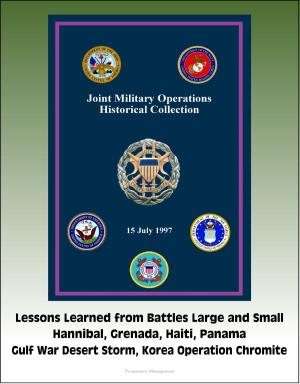Campaign Assessment in Counterinsurgency: Reinventing the Wheel - Vietnam War and MACV, Afghanistan and ISAF, Irrelevant Metrics Leading to Inaccurate and Useless Reports, Measures of Effectiveness
Nonfiction, History, Military, Vietnam War, Asian| Author: | Progressive Management | ISBN: | 9781370774999 |
| Publisher: | Progressive Management | Publication: | February 24, 2017 |
| Imprint: | Smashwords Edition | Language: | English |
| Author: | Progressive Management |
| ISBN: | 9781370774999 |
| Publisher: | Progressive Management |
| Publication: | February 24, 2017 |
| Imprint: | Smashwords Edition |
| Language: | English |
This excellent report has been professionally converted for accurate flowing-text e-book format reproduction. Strategic and political leaders have determined that the US and ISAF campaign assessments were neither useful nor accurate. The DOD 1230 biannual report titled the Report on Progress toward Security and Stability in Afghanistan provides comprehensive information to strategic and political leaders regarding the progress of the United States' strategy in Afghanistan. The report, however, has largely provided indicators of progress based off a single variable—enemy initiated ambushes. As attention drew to the failure of ISAF to provide accurate reporting, a degree of mistrust grew between strategic and political leaders and the military leaders in Afghanistan. In turn, strategic leaders made only partially informed decisions that did not reflect accurately the progress on the ground. The July 2013 DOD 1230 report touted a change in metrics, placing a greater emphasis on variables such as security force development and economic growth. The announcement of new metrics raised an obvious question, were the new measures of performance in Afghanistan actually better, and why had change taken so long?
Answering this research question required four steps. First, it was necessary to determine the importance of assessments and measures of performance in the development of strategy in the COIN environment. Second, it was necessary to examine how ISAF initially developed its assessment plan. Next, it was necessary to examine a historical instance of campaign assessments in COIN. The US and MACV in Vietnam experienced similar complications throughout the Vietnam War. Initially accused of intentionally bloating casualty figures, MACV made a concentrated effort to develop a more accurate assessment model to inform progress. The improved model, the Hamlet Evaluation System, analyzed a host of variables across South Vietnam to assess progress over time. Lastly, by comparing the efforts in Vietnam with those in Afghanistan it was possible to identify assessment concepts that would have been applicable in Afghanistan.
The evidence ultimately shows that as the US and ISAF sought to develop assessment measures, they replicated the errors made in Vietnam. Additionally, despite advances in technology, ISAF's assessment plan did not reach the level of sophistication that MACV achieved in Vietnam. Although the HES was criticized during the Vietnam War, the iterative attempts by MACV to improve its assessment plan provided useful lessons for the US and ISAF in Afghanistan.
This excellent report has been professionally converted for accurate flowing-text e-book format reproduction. Strategic and political leaders have determined that the US and ISAF campaign assessments were neither useful nor accurate. The DOD 1230 biannual report titled the Report on Progress toward Security and Stability in Afghanistan provides comprehensive information to strategic and political leaders regarding the progress of the United States' strategy in Afghanistan. The report, however, has largely provided indicators of progress based off a single variable—enemy initiated ambushes. As attention drew to the failure of ISAF to provide accurate reporting, a degree of mistrust grew between strategic and political leaders and the military leaders in Afghanistan. In turn, strategic leaders made only partially informed decisions that did not reflect accurately the progress on the ground. The July 2013 DOD 1230 report touted a change in metrics, placing a greater emphasis on variables such as security force development and economic growth. The announcement of new metrics raised an obvious question, were the new measures of performance in Afghanistan actually better, and why had change taken so long?
Answering this research question required four steps. First, it was necessary to determine the importance of assessments and measures of performance in the development of strategy in the COIN environment. Second, it was necessary to examine how ISAF initially developed its assessment plan. Next, it was necessary to examine a historical instance of campaign assessments in COIN. The US and MACV in Vietnam experienced similar complications throughout the Vietnam War. Initially accused of intentionally bloating casualty figures, MACV made a concentrated effort to develop a more accurate assessment model to inform progress. The improved model, the Hamlet Evaluation System, analyzed a host of variables across South Vietnam to assess progress over time. Lastly, by comparing the efforts in Vietnam with those in Afghanistan it was possible to identify assessment concepts that would have been applicable in Afghanistan.
The evidence ultimately shows that as the US and ISAF sought to develop assessment measures, they replicated the errors made in Vietnam. Additionally, despite advances in technology, ISAF's assessment plan did not reach the level of sophistication that MACV achieved in Vietnam. Although the HES was criticized during the Vietnam War, the iterative attempts by MACV to improve its assessment plan provided useful lessons for the US and ISAF in Afghanistan.















